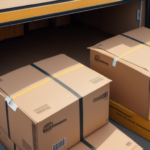How to Request a UPS Shipping Charge Correction for an Undeliverable 2nd Day Air Return
Understanding the Importance of Correct Shipping Charges
Shipping charges are a crucial element of the logistics process, significantly impacting the profitability of businesses. Incorrect shipping charges can result in financial losses for merchants and overcharges for customers, leading to a frustrating and costly experience for both parties. In the case of undeliverable 2nd Day Air returns, accurate shipping charges are essential to maintain efficiency and customer satisfaction.
Accurate shipping charges also play a vital role in customer satisfaction. Customers expect transparency and precision in the pricing of their orders, including shipping fees. Overcharging or mischarging can lead to a negative perception of the business, potentially resulting in lost sales and damaging the business's reputation. By ensuring correct shipping charges, businesses can build trust with their customers and uphold a positive market reputation.
Common Reasons for Undeliverable 2nd Day Air Returns
Several factors can cause a 2nd Day Air shipment to become undeliverable:
- Incorrect shipping addresses
- Missing or incorrect receiver information
- Weather-related delays
- Input errors by merchants when submitting shipment details
- Package damage during transit due to improper packaging or handling
To minimize undeliverable 2nd Day Air returns, merchants should ensure the accuracy and completeness of shipping information provided to UPS. Additionally, using sturdy packaging materials and clearly labeling packages can reduce the risk of damage and mishandling.
How to Identify Incorrect Shipping Charges on Your UPS Invoice
Merchants can identify incorrect shipping charges on their UPS invoices by:
- Reviewing shipment details against UPS-provided rates
- Comparing the actual weight and dimensions of shipments with billed amounts
- Checking for additional fees or surcharges, such as fuel surcharges, residential delivery fees, and address correction fees
Discrepancies in any of these areas should be addressed by requesting a shipping charge correction from UPS. Regularly reviewing UPS invoices helps ensure accurate billing and protects the business's bottom line.
Steps to Request a UPS Shipping Charge Correction for an Undeliverable 2nd Day Air Return
To request a UPS shipping charge correction for an undeliverable 2nd Day Air return, follow these steps:
- Contact UPS customer service via phone or email to report the undeliverable shipment and request a charge correction.
- Provide the shipment tracking number along with relevant documentation, such as a copy of the invoice or proof of delivery.
- Explain the reason for the undeliverable shipment and the incorrect shipping charges, if applicable.
- Negotiate with UPS customer service representatives to achieve a fair resolution.
- Document all communications and follow up as necessary until the issue is resolved.
Be aware of UPS's policies regarding shipping charge corrections. Corrections are typically issued only if the incorrect charge was due to an error on UPS's part, such as misclassification or incorrect weight measurement. Errors stemming from the merchant's side, like incorrect addresses or package dimensions, may not qualify for corrections.
Tips for Efficiently Communicating with UPS Customer Service Representatives
- Be Prepared: Have all relevant information and documentation ready to support your case.
- Stay Professional: Maintain a courteous and professional demeanor while advocating for your interests.
- Take Notes: Document the conversation details and confirm agreements in writing.
- Understand Policies: Familiarize yourself with UPS's policies and procedures related to shipping charge corrections.
- Follow Up: Keep track of the resolution timeline and follow up as needed to ensure the issue is addressed.
Effective communication increases the likelihood of a successful outcome when dealing with UPS customer service.
The Role of Documentation in a Successful Shipping Charge Correction Request
Thorough documentation is critical for a successful shipping charge correction request. Merchants should:
- Maintain accurate records of all shipments and invoices.
- Keep copies of all communications with UPS representatives.
- Understand the different types of shipping charges and their calculations.
- Implement a system for regularly reviewing shipping invoices to identify potential errors or overcharges.
Providing detailed and organized documentation can expedite the correction process and ensure accurate billing.
Potential Challenges and How to Overcome Them When Requesting a Shipping Charge Correction from UPS
Merchants may encounter several challenges when requesting a shipping charge correction from UPS, including:
- Language barriers
- Misunderstandings or miscommunications
- Difficult or unresponsive customer service representatives
To overcome these challenges, merchants should:
- Use clear and concise communication.
- Remain patient and persistent in their efforts.
- Escalate the issue to a supervisor if necessary.
Being well-prepared and maintaining a professional approach can help navigate these challenges successfully.
The Importance of Monitoring Your UPS Invoices After a Charge Correction Request
After a charge correction request has been processed, it's essential to monitor subsequent UPS invoices to ensure that corrected charges are applied correctly. Merchants should:
- Review all invoices carefully for accuracy.
- Follow up with UPS immediately if any discrepancies are found.
- Continue monitoring invoices for several billing cycles to ensure all corrections are fully implemented.
Regular monitoring helps prevent overpayments and ensures that shipping expenses are accurately recorded.
Alternative Options to Avoid Future Shipping Charge Disputes with UPS
To avoid future shipping charge disputes with UPS, merchants may consider the following options:
- Automated shipping software: Automates shipment processing, reducing the risk of human error.
- Outsourcing Logistics: Partner with a third-party provider to manage shipping and logistics efficiently.
- Regularly Review Shipping Procedures: Identify and improve areas within shipping policies and procedures.
- Negotiate Shipping Rates: Work with UPS to secure more favorable pricing.
- Explore Alternative shipping carriers: Compare and select carriers that offer competitive rates and reliable services.
- Implement a Shipping Charge Audit Process: Regularly review shipping invoices to identify and rectify discrepancies early.
Implementing these strategies can help merchants maintain accurate shipping charges, reduce disputes, and optimize shipping costs.
For more detailed information on optimizing your shipping processes, visit our comprehensive guides on UPS shipping rates and shipping software options.
Stay informed and proactive to ensure your shipping operations are cost-effective and customer-friendly.



















